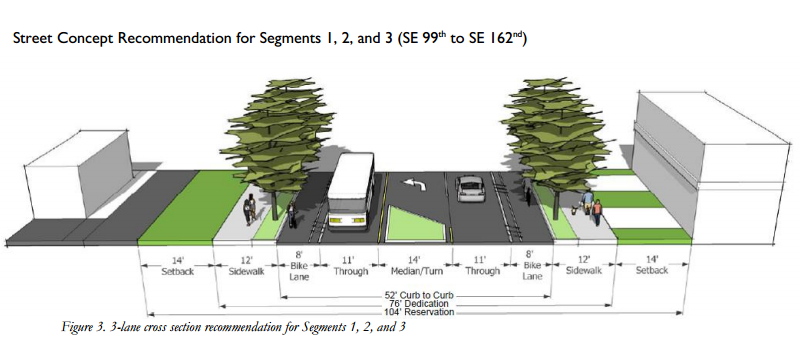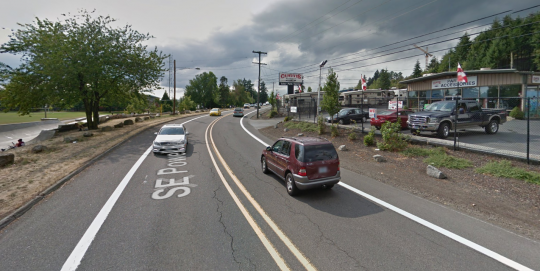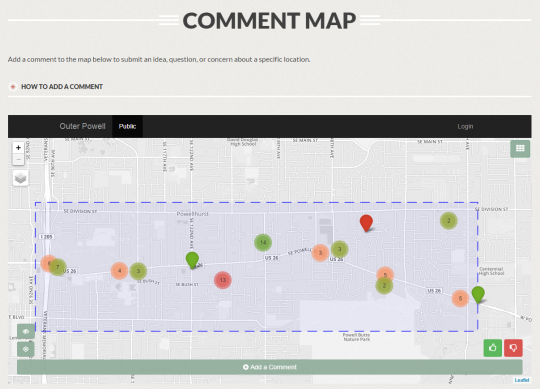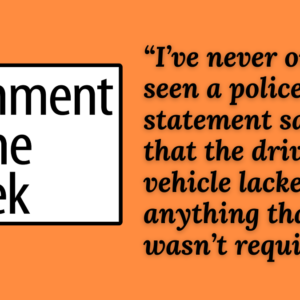
is among designs being seriously debated for
SE Powell east of I-205.
(Photo: J.Maus/BikePortland)
It’s looking as if the Oregon Department of Transportation might become one of the first state transportation agencies in the country to build a raised bike lane into an urban highway project.
It’s just a possibility and it’s still years away, but it’s the upshot of a meeting Monday in which several biking advocates urged the state to consider the design as part of its Outer Powell Safety Project.
David Hampsten of the East Portland Action Plan bike committee and the Portland Bicycle Advisory Committee said in an email this week that he attended to urge ODOT “to consider modifying the planned 8-foot bike lanes into either raised cycle-tracks or adding barriers between the roadway and the bikeway users (bikes and mobility devices).”
“ODOT was very receptive of such modifications, and will do cost estimates, especially as PBOT may be able to use SDC funds to help build such facilities after 2016,” Hampsten said. “They are also redesigning the intersections to better accommodate bicyclists at 122nd, 148th, 162nd, & 174th, as all are (or will be) major bus stops as well, as well as the greenway crossings at 108th/110th, 129th/130th, and at 157th/158th.”
Hampsten’s support for a physically separated bike lane was joined by Elizabeth Quiroz, the Bicycle Transportation Alliance’s East Portland advocate and a member of the citizen advisory committee that met Monday.
“I got the sense that they were willing to look more into that,” Quiroz said. “It’s pretty exciting.”
Advertisement
Cora Potter, another member of the citizen’s committee for the Outer Powell project who bikes to the meetings from her home in the Lents neighborhood, agreed.
“I think the general sentiment is to do some sort of treatment that separated the bike lane a little,” Potter said. “One of the major problems on Powell is people using the bike lane/shoulder for passing on the right.”

Potter said Hampsten in particular had suggested separating the bike lane with a “one to two-inch mountable curb,” like the ones the City of Portland has built on Northeast Cully Boulevard and Southeast Multnomah Boulevard. This would let buses and other motor vehicles roll into the bike lane if necessary (to pick up someone standing on the sidewalk, for example) while cuing people that their vehicle is leaving its main roadway.
Because the Outer Powell project seems likely to gradually rebuild much of the length of Powell between Interstate 205 and 174th Avenue, it presents a rare opportunity to cheaply build a curb-separated bike lane into what some residents hope will gradually develop into a significant commercial main street.
Alex Cousins, the project’s community engagement manager, said Thursday that much of the conversation about raised or protected bike lanes on Powell was “just educating people about what is possible.”
“For some folks, some of the newer or more different designs that you don’t see everywhere, it was just kind of a new idea,” Cousins said.
Much of the conversation at Monday’s meeting focused on five blocks of the project between SE 99th and 104th, alongside the Ed Benedict Skate Park, where the roadway is relatively narrow and more than a few feet of land acquisition might interfere with a nearby camper-trailer retail operation. On those blocks, project managers are discussing installing 12-foot-wide multi-use paths on each side of the street rather than separating the bikeway from the sidewalk.
Potter was particularly hopeful that ODOT might come up with a more comfortable design for biking through the intersection of 122nd and Powell.
“It’s, like, the most dangerous intersection in the city,” she said. She said there’s room and (thanks in part to the City of Portland’s new project on 122nd) money for “maybe doing something a lot better, maybe even a protected intersection treatment.”
At Saturday, Aug. 1, ODOT is planning a bike ride for people who use Powell to talk about possibilities for improving the street.
“We’re going to go out there and just ride the corridor with whoever wants to join us,” Cousins said. For details, email him: info@outerpowellsafety.org.
You can also submit a site-specific or general comment on the project website.









Thanks for reading.
BikePortland has served this community with independent community journalism since 2005. We rely on subscriptions from readers like you to survive. Your financial support is vital in keeping this valuable resource alive and well.
Please subscribe today to strengthen and expand our work.
“We’re going to go out there and just ride the corridor with whoever wants to join us,” Cousins said. For details, email him: info@outerpowellsafety.org.
ODOT said this?!? BikeLoud, BTA, et al. Please join him.
Sounds like a great event to post on the Pedal Palooza Calendar.
“Mountable” bike lanes should not be on a highway. There should be complete physical separation. Bus stops can be floating. And if people in cars need to pick someone up, they can do the same thing people in bikes are always told: use a side street.
There is no reason to need to be able to drive or park in the bike lane. At all. Ever.
Encouraging people to drive in the bike lane is a very bad idea. We just got one in Victoria and it has big problem with vehicles parking in it.
ORS 811.440 allows operation of a motor vehicle in a bike lane under the following circumstances:
(2) A person may operate a motor vehicle upon a bicycle lane when:
(a) Making a turn;
(b) Entering or leaving an alley, private road or driveway; or
(c) Required in the course of official duty.
(3) An implement of husbandry may momentarily cross into a bicycle lane to permit other vehicles to overtake and pass the implement of husbandry.
There are obviously lots of violations. I’ve seen it on Powell in the last week. I’d be interested in knowing whether citations are ever issued for this violation.
Last month I actually saw a PPB patrol car drive in the bike lane to pass a vehicle making a left turn. I complained to the PPB in an email. I allowed that it could have been an exception (see 2c, above), but that it set a bad example. I received a nice response saying they’d remind officers of how their behavior sets an example.
They actually had some billboards on Powell about people not passing left turning cars in the bike lane. Don’t really think they’ve done any good. It’s pretty MadMax-ish out there on much of the street.
Thanks for posting this, it’s something I have been wrong about.
“(a) Making a turn;”
Is it really legal for people who are turning to pull into (block) the bike lane while waiting at a light, instead of remaining in their own lane until safe to turn?
That seems problematic, yet according to the statute, it would appear to be the case.
No it’s not. In the situation you describe, they are still pointed straight. They are not in the act of “making a turn.”
There are some places around town where the bike lane is dashed, not solid, approaching an intersection. These are places where someone in a car is supposed to *cross over* the bike lane to reach the far right-turn lane.
In Oregon, someone in a car is never supposed to merge *into* the bike lane and drive along in it to set up a turn. But it’s different in California and likely in other states. There has been much debate here and elsewhere in the past about whether California-style or Oregon style is better and safer.
I’m glad its being discussed, but I honestly don’t get how someone can advocate for a raised bike lane with a low profile mountable curb – is it because it looks pretty, or they can say “we have a separated bike lane?” The costs for labor and materials, complications with drainage, and the actual safety upgrade when compared to candlesticks & stripes is not even debatable. Raised bike lanes w/mountable curbs are a great example of physical separation without protection. They’re like a 2 foot striped buffer but at 500x the cost.
if you’re going to raise the bike lane use full height curb.
If you’re going to post the speed as 35 mph, provide separation between the bike lane and auto traffic.
It would mean extending PedalPalooza for another 5 weeks. That is a week before Bridge Pedal. Maybe a free warmup with about 20,000 riders. Would hate to be a car, truck, or buss trying to get through the Barrage of bikes.:)
The :Mountable bike path on SW Multnomah is only on the north side. The south side puts the bike on the same level as the sidewalk and dodging depressed planters.
Suggest putting the pedestrians between the bike path and the motorized traffic. with something to keep the texting peds with the earphones off the bike path.
I am a NE Cully daily user for commutes. It always seems to me to be the worst section of my ride for having glass all over the lane. Non-scientifically, I have always believed this to be related both due to the very low car traffic and the height. it is frequently so full of glass, that I have to ride alongside it in the car lane.
Michael, thanks for the phone call this afternoon — I’m sorry that I was unavailable to talk to you on deadline. Here are some more fun facts on Outer Powell:
• ODOT Region 1 is committed to developing a set of safety improvements on Powell Boulevard (US 26). Our partners, the City of Portland, TriMet, Metro to name a few, are very engaged in this process
• Safety advocates have excellent allies in Rep. Shemia Fagan and Rep. Jessica Vega Pederson. They both are focused on seeking funds for improvements on this corridor as well as in other areas of East Portland. If the session ends without funding for Outer Powell, it’s not for their lack of effort and dedication to their constituents
• The environmental process that we started in fall 2014 is scheduled to end in 2016. The purpose of this phase of the project is to understand the environmental impacts of widening Powell for a turn lane, bike facilities and sidewalks. This step readies the project for final design and construction once funding is secured
• Monday’s Community Advisory Group meeting was great. The diverse members of this advisory committee continue to be extremely engaged. And non-committee members who attended the meeting brought interesting ideas. Our environmental process defines the project footprint – not the final-final design details – and will not preclude considering buffered bike lanes, a raised bike facility and other possibilities. Funding, maintenance, storm water management are a few examples of issues that will ultimately influence what gets constructed
This is an extremely worthy project in a dynamic area of Portland that needs transportation improvements. I’d like to thank everyone for their participation and look forward to hearing more input during the next year of environmental planning.
This is one of the most inspiring communications I have seen from ODOT in a long time. Thank you Mike for your leadership and facilitation of this process. Looking forward to it.
I have found Powell from 205 to Gresham to be full of glass along side the road like the drunks consider it gravel. Used to live in Binford edition and still ride out there on way to Sandy. The curbs next to a concrete bike path is an excellent target for the drunk party people that are driving around after dark to really smash bottles. Thank goodness for cans.
A Copenhagen-style raised bike lane would be fantastic. Coupled with protected intersections, it would really help improve safety along a dangerous corridor. I’m glad that ODOT seems open to the idea and hope that they actually go though with the project.
““ODOT was very receptive of such modifications, and will do cost estimates”
On the face of it a reasonable point, but then I remembered the ODOT (Matt Garrett’s) line when stumping for the CRC:
from here:
http://bikeportland.org/2012/05/16/interview-with-odot-director-matt-garrett-part-2-71684#comment-2909524
if they only do buffered or a 1-2″ rise then they need to put little cement islands at every cross-street to keep people from passing on the right in the bike lane… a physical barrier is the only thing that will keep drivers from doing it…
Maybe if they make it out of something other than concrete (riding over expansion joints sucks!) and promise to actually clear the glass/gravel/etc. out of it. Problem with raised lanes is they don’t really provide much separation when made with mountable curbs. On top of this because they’re perceived as safer pedestrians will tend to use them. You don’t want to get me started on the stupidity of many pedestrians.
I also agree with previous comments about allowing car traffic to stop in them. Drivers should NEVER be picking up people by stopping on a busy street. They should be going to the next side street/parking lot/driveway. How does it ever sound like a good idea to have the lane blocked, then ask the cyclist to get down the curb at completely the wrong angle to get around the blockages? Talk about a good recipe for accidents.
No one should condone a bike lane that’s meant to be driven on. That’s asinine. That will not prevent drunks, texters, or other negligent drivers from killing and maiming vulnerable road users. This corridor NEEDS separation to be effective. SE 26th and Powell is still scary as hell even after the turn signals were installed. We need to think bigger, and get separated lanes via larger curbs. Please don’t cave to this approach, it’ll still lead to injury and death.
I think it’s fabulous that folks at ODOT are showing some willingness to come to the table and consider ideas outside their normal comfort zone. The offer to get up close and personal with the corridor, while opening the ride to interested parties, is a nice way to reach out as well.
If zero fatalities is the goal, Powell should not be posted higher than 30 mph – the 10% risk of fatality when a vehicle is broadsided at an intersection.
If zero fatalities is the goal, Powell should not be posted higher than 30 mph unless the pedestrian path and bike path are separated from the auto lanes by at least 5 feet.
if….
As a truck driver I say make the mountable curb AT LEAST as high as a standard sidewalk curb. In tight urban situations it is very common for the trailer tires to track ovet a curb and it is nearly impossible to feel unless you are going over 5~10mph. To me this says that it could stand to be a little taller to discourage sports car and SUV impatience while not impairing “freight access”. You want improvements for safety…. they’ll be a lot easier to get approved if the trucks can still get through. As a truck driver I personally would rather deal with a 5mph pedestrian/bike throughway that doubles as an access road than some place car drivers are being blankity-blank unpredictable loons.
As a bike riding type person… DEAR GOD DON’T PAINT THE MOUNTABLE CURB!
As someone who rides on NE Cully nearly every day, I would certainly not look towards a raised bike lane as a way to improve safety on Powell. I am constantly dodging broken glass, parked cars (IN the well-marked bike lane) and bike salmon. Also, the weaving path of the bike lane makes me feel like I’m riding unpredictably in traffic. People seem very confused about the function of this raised bike lane and I can’t imagine how much worse it would be if it were located on a higher traffic roadway.
This section of road is definitely the worst part of my commute. I feel far less safe riding on the raised curb section of Cully Blvd. than I do in the bike lane a few blocks south.
Eugene did a mountable curb bike lane about 20? years ago on Ayers Lane. It seems a lot better than just paint, but the city hasn’t done much with physical separation since then. I don’t know why.
https://www.google.com/maps/@44.102111,-123.086963,3a,75y,307.14h,71.46t/data=!3m6!1e1!3m4!1sXnxdtIPZZp3YgGpEscF1sQ!2e0!7i13312!8i6656!5m1!1e3?hl=en
As long as there is room for cyclists to safely get around obstacles in their lane and this doesn’t give cyclists a false sense that drivers will see them when they’re turning, you go, infrastructure fanboys.